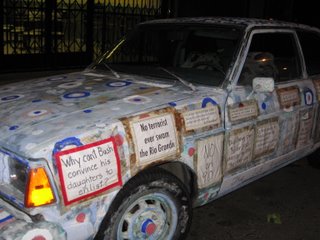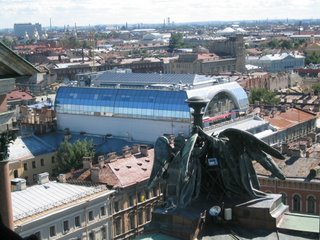



this is my curiosity cabinet of the intellect, where i carry out my sentence(s)...


"The great naturalist, Fritz Müller- who was the first to describe the scent scales- mentions how, on his journeys in Brazil, he often carried a Paplio Grayi with him, just for the purpose of sniffing its scent when the mood took him." - Niko Tinbergen Curious Naturalists
"Ulysses, like everything else of Joyce's, was written entirely by hand. He used blunt black pencils- he found the ones he wanted at Smith's in Paris-and pencils of different colors to distinguish the parts he was working on. Fountain pens he didn't understand at all. They bewildered him. Once I found him struggling to fill one, covering himself with ink as he did so. Sylvia Beach Shakespeare and Company
Quicknotes on the books I finished reading this week:
The Great Gatsby, by F. Scott Fitzgerald. I read it before when I was young. Now after reading it again, I am convinced I should read it at least once every other year. As I was reading, I would come across an amazing line that I would want to write down, but I just couldn't stop reading. Nothing I have read exposes the farce of the American dream as well as this novel. Material desires hiding the gaping emptiness of a life not examined.
I finished up the novel while I was at Bourbon & Branch in SF, a faux speakeasy-era bar with expensive, but good-looking cocktails; I had two. A few things I learned: Fitzgerald was an alcoholic, but he never wrote drunk, he was an amazingly sober writer and it shows in his prose. He was born in Minnesota; a Mid-Westerner transplanted to the East Coast; like Gatsby. And like Gatsby, Fitzgerald fell in love with a socialite (Zelda) who rebuffed his initial marriage proposal. He wrote his first novel, which became a success, he made some money, and he got to marry the girl; who ended up going insane and was confined to a mental institution. Nothing like love to drive you mad.
Speaking of mad, I also read The Blue of Noon, by Georges Bataille. Talk about a crazy novel, leave to Georges to leave me with my mouth open, thinking, "I can't believe someone wrote that." My head spun reading this novel of drunkenness and despair; written in 1935, all around, Europe falls into pieces and the characters lose themselves in grotesque debauchery and perversity.
I also read The Modern Mind, by Peter Watson. A dash into the great-breaking ideas that affected and transformed the 19th-20th Centuries. There's some decent reviews of the book here. I agree with most of it. It is a good book to get started on developing a foundation of historical understanding for the last 100+ years. Watson's analyses on novels were succinct and inspired, so much that I added another half dozen to read, plus I read The Great Gatsby again. I developed a mini-crush on this Watson fellow, even though he's older than my father. I imagined all the books he must have read, all the mental calculations it took to connect it together in this massive book; and it fulfilled my esurient need for understanding how the parts fit together. It could have plodded along, but Watson uses his journalistic skill to keep it an engaging read.


"My life was following an increasingly crooked path. I used to go to various places for drinks, walk around aimlessly, and finally take a taxi home. It was then, in the depths of the taxi that I could think of Dirty and burst out sobbing. I no longer even felt any pain, or the least anxiety; inside my head, I was aware of nothing but absolute stupidity. It was like a state of perpetual childishness. I was shocked by the madness enacted by my wild state of mind whenever I wanted to tempt fate, and I recalled the irony and courage I had shown; and, of all that, the one thing left was the feeling that I was some kind of idiot, extremely touching perhaps, but in any care ludicrous. " Georges Bataille Blue of Noon
Cioran's grave at Cimetière du Montparnasse, Paris
Since I'm being personal-
Thoughts which come to my head when it is 2AM and I am faced with a second night of sleeplessness:
I often wonder if romantic love is a folie à deux, a sort of socially-sanctioned lunacy; and I want out of the madhouse. I wonder if sex and love collide into a dangerous cocktail of delusion; a sly toxin intoxicating the imbiber with destructive dreams. Romance is one bland illusion, slated to disappoint every time.
If some moony-eyed moron ever comes running towards me babbling such love-laced obscenities, I 'm going to punch him square between the eyes to clear his head. "Proselytize elsewhere," I will scoff, "I'm an ex-convert of your crap religion."
Maybe it's just me. After all, I have sought out these very captivating jailors, only to resent the trap I help them create to confine me. A part of me (a large part) feels that I would prefer to run off to some remote city in Iceland and spend the rest of my life reading books, never to speak to anyone I know, ever again (or maybe a tree house in Turkey- if there are still trees in Turkey).
I love my current boyfriend, I really do. I think he's the kindest, most charming person I know. And, despite my seemingly grouchy demeanor, I do believe in love and relationships. I believe in the kind where people genuinely like to talk to each other and like each other's company. I believe in someone who will stroke your hair when you are saddened by the world, and who will give you kisses on the head before you go to sleep.
I do not believe in the tumultuous, storm-saturation that masquerades as some sort of emotional connection. I will never allow myself to fall into that silliness ever again.
Then again, maybe I just need more sleep.




I finished reading this last night. Another classic which embodies the characterists of the modernist novel. A good review here. And if you want to read a 30 page interview with Durrell to learn about his roving life in between the world wars- go here.
And if you want to understand the modernist novel- here's a handy little comparison I found.









"What a splendid thing it is to sleep and dream, just think! The whole of our life is a dream and the best thing in it is, again, dreaming."
"A sort of spiritual hush has come upon me since I moved in here; I don't want to do anything, I don't want to see anyone, there's nothing to dream about, I'm too idle to have ideas-but I'm not too idle to think: these are two different things…"
- Ivan Turgenev Faust
I've been reading this book: The Modern Mind: An intellectual history of the 20th Century by Peter Watson, who wrote an excellent article copied below:
History shows that true innovation has disappeared from our society
Peter Watson Sunday May 22, 2005 The Observer
Next month, in Christie's big sale of valuable books and manuscripts, the highlight is a rare offprint of the famous volume 17 of Annalen der Physik, in which Albert Einstein's three great ideas - on the special theory of relativity, the law of mass-energy equivalence (E=mc2), and the Brownian Theory of motion - were revealed. The occasion marks the 100th anniversary of Einstein's breakthrough.
But the sale of Einstein's papers recalls to mind that they were not the only remarkable event of that remarkable year. Matisse painted Luxe, calme et volupté and Les Fauves were born. Cézanne produced Les Grandes Baigneuses, whose lozenges of colour first pointed to cubism and abstraction. Lenin published Two Tactics, EM Forster wrote Where Angels Fear to Tread, the first regular cinemas opened, Richard Strauss unveiled Salomé and Freud followed The Interpretation of Dreams with his Three Contributions to the Theory of Sex. The Austin motor company (remember that?) was formed, the first motor buses in London appeared, the first neon signs.
The year 2005 can't begin to compete with 1905 in terms of important innovations. Last week's announcement that British and Korean scientists have successfully cloned human embryos only reinforces the point. What else of real importance has happened this year?
We flatter ourselves that we live in interesting times but isn't this just one more example of that particular blindness our solipsistic age has about itself, a more severe form of the disease whereby Princess Diana can be rated the most important (or was it second-most important) Briton ever?





















